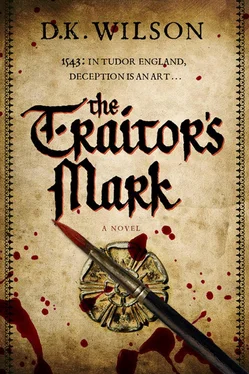D. Wilson - The Traitor’s Mark
Здесь есть возможность читать онлайн «D. Wilson - The Traitor’s Mark» весь текст электронной книги совершенно бесплатно (целиком полную версию без сокращений). В некоторых случаях можно слушать аудио, скачать через торрент в формате fb2 и присутствует краткое содержание. Год выпуска: 0101, Издательство: Pegasus Books, Жанр: Исторический детектив, на английском языке. Описание произведения, (предисловие) а так же отзывы посетителей доступны на портале библиотеки ЛибКат.
- Название:The Traitor’s Mark
- Автор:
- Издательство:Pegasus Books
- Жанр:
- Год:0101
- ISBN:нет данных
- Рейтинг книги:5 / 5. Голосов: 1
-
Избранное:Добавить в избранное
- Отзывы:
-
Ваша оценка:
- 100
- 1
- 2
- 3
- 4
- 5
The Traitor’s Mark: краткое содержание, описание и аннотация
Предлагаем к чтению аннотацию, описание, краткое содержание или предисловие (зависит от того, что написал сам автор книги «The Traitor’s Mark»). Если вы не нашли необходимую информацию о книге — напишите в комментариях, мы постараемся отыскать её.
The Traitor’s Mark — читать онлайн бесплатно полную книгу (весь текст) целиком
Ниже представлен текст книги, разбитый по страницам. Система сохранения места последней прочитанной страницы, позволяет с удобством читать онлайн бесплатно книгу «The Traitor’s Mark», без необходимости каждый раз заново искать на чём Вы остановились. Поставьте закладку, и сможете в любой момент перейти на страницу, на которой закончили чтение.
Интервал:
Закладка:
‘’Tis not time yet to talk of wills,’ I protested. ‘We will bring your enemies to justice and you can take up your life again.’
He shook his head. ‘Does it not alarm you, Master Treviot, how much hatred there is in the world?’
‘Indeed it does. Wherever I go – in the City, in villages, in churches, in court rooms, in great men’s palaces – people are at odds with their neighbours, friends fall out, the king’s subjects seek to destroy one another.’
‘Everywhere,’ he said wearily. ‘’Tis the same everywhere.’ He paused. ‘You know I’m a citizen of Basel – officially. When I settled there, years ago, it was like a haven of peace and common sense. I had many friends. Some called themselves “Catholic”; some had forsaken the old church, but all, I think, were men of generous spirit. Young, of course, and enthusiastic for our own beliefs. We could – often did – argue the night away. But seldom with rancour. Then I came to England, never intending to stay. I made more friends. I was introduced to the king’s court. I prospered.’
‘You well deserve your success,’ I said. ‘There is no finer limner in England, perhaps in Europe.’
‘They were good years.’ Holbein continued with his reminiscence, as though talking to himself. ‘Then I returned to Basel. Everything had changed. It wasn’t enough, any more, to know what you believed; you had to make everyone else believe the same. That led to mob warfare on the streets. Gangs attacked churches. Pulled down statues. Slashed paintings. The city council gave way. All religious art was banned. No one needed painters any more. So I came back here. Do you know what I found?’
‘That things were much the same in England?’
‘Yes, like the plague, religious fervour had crossed the water. Even my old patron, Sir Thomas More, had taken to locking men up and having them tortured.’
‘Yet you stayed and established a brilliant career.’
He stood and walked over to his easel. Taking up a brush, he began dabbing at the canvas. ‘What an artist feels, he must try to bring out of himself; put it into his work. Your great men and women wanted portraits. I made them; tried to show them not just what they looked like, but what they were . I don’t know if any of them ever realised that the “Oh so fashionable German, Master Holbein” was looking into their souls.’
‘You must take much satisfaction from your success.’
‘Looking into their souls,’ Holbein continued, as though he had not heard. ‘But my soul? What happened to that? The success, the acclaim, the money – they took over. But the soul? I think it shrivelled. I had a wife and children but we drifted apart. I didn’t want to go to Basel. They didn’t want to come to England. I thought I had found happiness with an English woman. Soon I had a new family. Then my two little girls died. My woman left. All I had was my work, my fame, my clamouring patrons.’
‘That would be enough for many craftsmen.’
‘Patrons. So generous. So loud in their praise. But they always want more than they give. Even the greatest man in England. Especially him.’
‘Lord Cromwell?’
‘Yes. I miss him. He was brilliant. I could always talk to him. He understood. And I understood him. He made me see that the troubles England was going through were just birthing pains for the godly commonwealth he was bringing into the world. So, when he asked more of me than just painting, I was ready …’
‘He wanted you to spy for him?’
‘He called it “keeping him informed” about potential enemies.’ Holbein laid down the brush and turned to me. ‘Do you know I could have saved him?’
‘How?’
‘I discovered what Lord Norfolk – that haughty, misbom, foul-tempered proudster – was planning. But I did not get the message to Cromwell in time. That will always haunt me.’
‘Is that why you are so anxious to have your information passed to Archbishop Cranmer, now?’
‘He is a good man and Norfolk is up to his usual foul tricks. But now he is part of something much bigger. We cannot let him and his fellow conspirators succeed this time.’
‘This information you have – will it really stop him?’
‘Oh yes, if it is correctly used. His grace will know how to use it, if you pass it on to him.’
‘But you can give it to him yourself. We’ll get you to him safely.’
‘No, that won’t work. Norfolk and his associates must not know that their plans have been discovered. If they do they will simply disband and wait for another opportunity. They are diabolically persistent. They will go to absolutely any lengths.’
‘So I’ve discovered. They killed your assistant, they left van der Goes half-dead and they’d have let the children starve.’
‘The only way to avenge these wrongs is to close down the whole organisation. You will be able to do that, but only if they believe that I have failed in my mission.’
‘ But that would mean letting them capture you.’
The painter smiled and nodded. Suddenly I recalled Meyer’s words about Holbein nursing the idea of suicide. ‘You can’t do that!’ I protested.
‘It is the only way, Thomas. I have had plenty of time to think about it. I must admit when I heard what had happened to poor George my instinct was to run away, get on a Hanse ship and escape. But where to? Basel has no charms for me now. My family there are provided for. They’re perfectly happy without me. At my age I can’t start building a career somewhere else. In any case, I’m too old-fashioned. The demand now is for a debased, exaggerated, “showy” art. I hate it. So my time is over and I am content.’
‘My dear friend, this is foolish talk. Your talent is unequalled. You are painter to the King of England.’
He gave a cynical laugh. ‘To a king who has no more commissions for me.’
‘But-’
‘No, Thomas, you waste your breath seeking to dissuade me. I count myself very fortunate. It is not, I think, given to many men to know when their time in this world is spent. I have played my little role and I leave the stage willingly. The play continues, but my part in it will soon be forgotten. There’s one important thing left for me to do and, with your help, I can do it.’
‘Very well,’ I said. ‘Give me the information and I’ll leave you – but only with a very heavy heart.’
To my surprise, Holbein laughed. ‘I’ve already sent it to you – or part of it, but you must have missed it.’
‘The engraved coat of arms on the chalice design?’
‘Ah, so you did notice it. It was a very faint chance but the only way I could think of at the time. When I heard you had become involved I tried to think of something that might catch your attention. I recalled our frequent discussions of cyphers and concealed meanings. You know I have a weakness for that sort of thing. That heraldic device will identify the man whose twisted mind lies behind the attack on the archbishop and so much more devilry.’
‘Yes, I have discovered him and warned the archbishop.’
‘Excellent! Then most of the work is done. But there is more information – times and dates – that will complete the picture. This man – I never knew his name …’
‘Thomas Moyle,’ I said.
‘Really? Well, he is the organiser. He has links with important men here and abroad. He came two or three times to see the Duke of Norfolk. The first was when I was at his house in Kenninghall working on a new portrait. The duke was out of favour following the fall of his niece, Queen Catherine Howard, and seething with fury about those who had exposed her and brought him close to ruin. Then, more recently, this man – Moyle, you say? – visited his lordship again in his chambers at Whitehall Palace. They always talked in secret but I managed to overhear a few snatches of conversation – enough to realise their treachery. I memorised the heraldic badge worn by the man’s servants. Unfortunately, I was not quite discreet enough. The conspirators were suspicious. They could do nothing immediately because I was with the royal court – a small commission for the new queen. When I left, they sent their pet assassins to waylay me. As you know, I escaped and have been in hiding ever since, trying to think how I could convey what I know to the archbishop or some trusted friend. Thank God, I can now do that. In the morning I’ll allow myself to be captured. Now, Thomas, listen carefully. The traitor’s visits to Norfolk-’
Читать дальшеИнтервал:
Закладка:
Похожие книги на «The Traitor’s Mark»
Представляем Вашему вниманию похожие книги на «The Traitor’s Mark» списком для выбора. Мы отобрали схожую по названию и смыслу литературу в надежде предоставить читателям больше вариантов отыскать новые, интересные, ещё непрочитанные произведения.
Обсуждение, отзывы о книге «The Traitor’s Mark» и просто собственные мнения читателей. Оставьте ваши комментарии, напишите, что Вы думаете о произведении, его смысле или главных героях. Укажите что конкретно понравилось, а что нет, и почему Вы так считаете.












